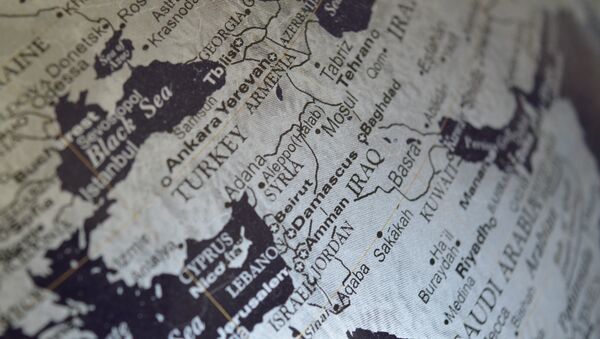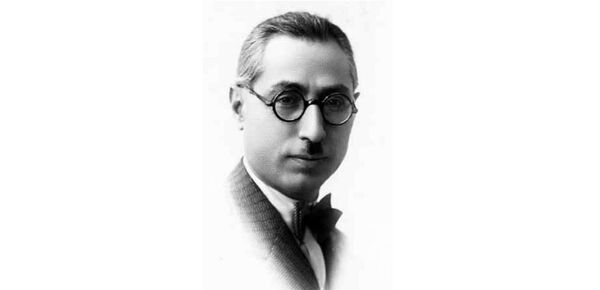Jamil Mardam Bey, the Syrian politician who served as prime minister during the French Mandate period between 1936-1939 and then again between 1946-1948 after Syria declared independence, provided crucial intelligence to Zionist leaders, several years before Israel came into existence, historian and Ben-Gurion University of the Negev professor Meir Zamir alleges.
In an article in Haaretz, the academic claims, citing information from French and Israeli archives and Syrian government documents, that Mardam Bey, long-thought to be one of the “founding fathers” of the modern Syrian Arab Republic and a hero who resisted Ottoman and French colonialism, was in fact a double or even triple agent who provided information to the Zionist movement as it sought to gain independence from the British in post-war Palestine.
According to Zamir’s information, in the immediate postwar period, French intelligence discovered Mardam Bey’s recruitment by the MI6, and by Iraqi Prime Minister Nuri Sa’id, with London and Baghdad seeking the Syrian politician’s support for the creation of an Arab superstate known as ‘Greater Syria’. Under the plan, Syria, Iraq, and the Transjordan would be united into a single country allied to the UK and under the rule of Jordan’s Hashemite royal family, with Mardam Bey tapped to be its head of government.
Threatened with blackmail by the French, who promised to leak compromising documents to his political opponents if he refused to cooperate, Mardam Bey was said to have agreed to become an agent for French intelligence, providing them with information about London’s plans in the region. It was at this time that Mardam Bey became an agent for the Zionist movement seeking to establish a Jewish state in Palestine, according to Zamir.
The historian’s account stands in sharp contrast with the widely accepted historiography of Syria’s immediate post-war history. In May 1945, weeks after the end of the Second World War in Europe, French General Charles de Gaulle ordered that Mardam Bey, who was serving as Syria’s minister of foreign affairs, economy and defence at the time, be arrested, with the politician and other Syrian officials accused of interfering with French interests in the Middle East. In a military raid on Damascus, French troops destroyed the Syrian parliament building and the ministry of defence, and ransacked Mardam Bey’s office, confiscating documents and razing it to the ground.
Archival Evidence
However, according to Zamir’s information, based on his archival research, a Zionist official named Eliahu Sasson became Mardam Bey’s handler in late 1945, while the latter had been serving as Syria’s ambassador to Egypt.
Sasson was chief of the Arab division of the political department of the Jewish Agency, the World Zionist Organization-affiliated entity known for encouraging Jewish immigration to Palestine. Sasson was tapped by David Ben-Gurion, the future founder of the State of Israel and its first prime minister, to coordinate with French intelligence in gathering information from Mardam Bey.
Born in Syria, Sasson knew Mardam Bey personally, having met him in 1937 during the politician’s first term as prime minister. This personal relationship presumably helped enabled Sasson gain the Syrian politician’s trust.
Zamir also cites the diary of a Zionist activist named Maurice Fischer, who would come to serve as Israeli ambassador to France, that Mardam Bey was indeed “an important source of information for Ben-Gurion,” and that he had revealed to the Zionist agents the secret Anglo-Iraqi Greater Syria” plan.
The historian also includes evidence of the French intelligence service’s recruitment of Mardam Bey, including a report dated September 1945 by Jewish Agency liaison officer Nahum Wilensky, which indicated that Paris was aware of London’s payments to Syrian leaders, including Mardam Bey, and that the French were using this information to put pressure on these persons.
British Plans to Crush Fledgling Jewish State
Zamir believes that perhaps the most crucial information provided by Mardam Bey to Ben-Gurion from July 1945 onward was evidence of British military and intelligence plans to crush any fledgling Jewish state should it attempt to declare independence in the immediate post-war years. This, he writes, included information provided by the Syrian politician about the British Mandate for Palestine authorities’ plans to disarm the Jewish Haganah paramilitary organisation and to declare it a terrorist organisation, and to implement the Greater Syria plan, which envisioned the creation of some sort of Jewish autonomy, but not a fully independent state.
Mardam Bey was also said to have provided Ben-Gurion with information about the existence of a mole within the Jewish Agency, and to have relayed Arab League concerns about the dangers of a military confrontation with a well-armed and internationally supported Zionist movement in Palestine.
British-Iraqi plans for a Greater Syria were reportedly ultimately foiled by the Saudi monarchy and the United States, with the Truman administration putting pressure on London to renounce its support for the idea in July 1946, months after Syria’s declaration of independence in April of that year. In December 1946, Brig. Iltyd Nicholl Clayton, head of MI6 in the Middle East, reportedly helped push Syrian President Shukri al-Quwatli to select Mardam Bey for the post of prime minister.
If the information is confirmed, Zamir’s account would upset Middle East historians’ long-standing conceptions about Mardam Bey and Syria in the immediate postwar period. Publicly, Mardam Bey did not show any outward sympathy to the Zionist movement or to Israel, and declared war on the fledgling Jewish state immediately after its declaration of independence in May 1948, providing thousands of troops to engage the newly-formed Israel Defence Forces.
Syria’s Ba'ath Party would accuse Mardam Bey of engaging in profiteering during the 1948 conflict with Israel, and of poor leadership on the battlefield, but never of espionage for the Zionists. His conduct of the war, as well as his institution of martial law and declaration of himself as a military governor, ultimately led to his August 1948 downfall. Mardam Bey spent the remainder of his life in Egypt and Saudi Arabia, passing away in 1960 in Cairo at the age of 66.






